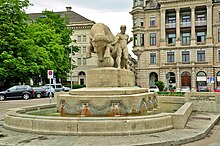Arnold Geiser
Arnold Geiser (born February 27, 1844 in Langenthal , † December 24, 1909 in Zurich ) was a Swiss architect and city planner .
life and work
Arnold Geiser attended secondary school and middle school in Morges in Langenthal . In 1860 he entered the preliminary course at the Swiss Federal Polytechnic in Zurich, graduating in 1864 as a qualified architect. Geiser then worked as a site manager in the building construction department of the city of Zurich. When the then city architect in 1869 and a year later the building police councilor resigned Geiser in 1870 and later still as a new building police councilor and the councilor elected as the new city architect. As such, Geiser worked for the city of Zurich for 32 years.

In addition to the usual planning of maintenance work and the smaller renovations to urban buildings, many new buildings were built during this time. As a representative of historicism , Geiser was responsible for numerous new buildings a. a. the Enzenbühl , Nordheim cemetery and the Sihlfeld cemetery and its crematorium . Geiser also worked on the preliminary studies for the quay structures and the redesign of the scratching area . He was also involved in the redesign of the Opera House , the Art House and the Tonhalle in Zurich.
From 1876 to 1882 Geiser worked as an assistant to Ernst Georg Gladbach . From 1876 to 1901 he was President of the Swiss Association of Engineers and Architects in Zurich. He later became its honorary president . He was also a member and president of the Zurich men's choir «Harmonie».
Arnold Geiser was buried next to his friend and sculptor Joseph Regl (1846–1911) , who came from Upper Austria, in an honorary grave (FG 81135) of the city of Zurich at the Sihlfeld cemetery. The "Geiserbrunnen" on Bürkliplatz , created by Jakob Brüllmann and donated by Geiser, bears his name in his honor.
Arnold Geiser named the community of Langenthal as the principal heir in his will and bequeathed almost CHF 100,000 to her with the stipulation that the assets would be used for the construction of a concert and theater hall. This later became the Langenthal City Theater .
literature
- Andrea Weibel: Arnold Geiser. In: Historical Lexicon of Switzerland .
- In memory of Mr. Arnold Geiser: Former city architect of Zurich. 1909. (Brochure, 12 pages)
Web links
- Arnold Geiser. In: alt-zürich.ch
- Arnold Geiser. On the website of the building construction department of the city of Zurich
- Geiser, Arnold. On the website of the city of Langenthal
- Obituary for Arnold Geiser. In: Schweizerische Bauzeitung . Vol. 55, 1910, pp. 12-13.
| personal data | |
|---|---|
| SURNAME | Geiser, Arnold |
| BRIEF DESCRIPTION | Swiss architect and city planner |
| DATE OF BIRTH | February 27, 1844 |
| PLACE OF BIRTH | Langenthal |
| DATE OF DEATH | December 24, 1909 |
| Place of death | Zurich |